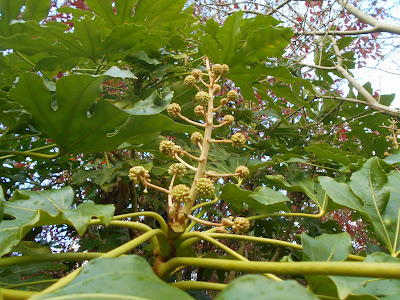A shady brick wall at the High Street end is home to a colony of Maidenhair Spleenworts, Asplenium trichomanes.
 |
Maidenhair Spleenwort is found on several walls around Byfield.
7 November, 2018
|
This species, dainty and well worth a place in the rock garden, was indeed, as the name suggests, once used to treat diseases of the spleen. The dried fronds have apparently been used as a substitute for tea - but Ty-phoo will do me!
Apart for a few lingering flowers Ivy, Hedera helix, is now busy developing its fruits. The loss of its flowers will rob many insects of a valuable source of both pollen and nectar, the former proving protein and the latter useful for building up fats for the winter.
 |
Ivy has largely ceased flowering and the fruits are developing.
Byfield, 7 November, 2018
|
But help will shortly be at hand. Nearby a strong-growing plant of Fatsia japonica will soon be coming into flower and will, on mild days, be besieged by insects. These two plants are closely enough related to hybridise, the offspring being called x Fatshedera lizei. The x symbol in front of the name indicates that the plant is a bi-generic hybrid. This type of hybrid, between species of two different genera, is unusual and the offspring are invariably infertile.
 |
| Fatsia japonica beyond a wall in Byfield. 7 November, 2018 |
The cross has been made on a number of occasions with slightly varying results each time. They must, of course, be propagated by vegetative means.
Lemon Balm, Melissa officinalis, grows atop a wall a little further down but at this time of the year is too tatty to photograph although the leaves are still fragrant. Like many plants with scented leaves such as sage, thyme and lavender, it is a member of the Mint Family, Lamiaceae.
Leaving the alley my walk took eventually took me past a Beech, Fagus sylvatica, tree. Some of the leaves had been mined by the Small Beech Pigmy, Stigmella tityrella. The mines of this common but tiny moth have the curious effect of causing part of the leaf to retain its chlorophyll, giving the leaves in question a very distinctive appearance.
 |
Mining by the Small Beech Pigmy moth can produce curious effects.
Brightwell playing fields, Byfield. 7 November, 2018
|
No comments:
Post a Comment